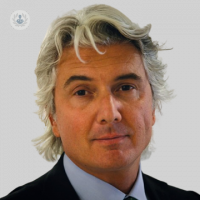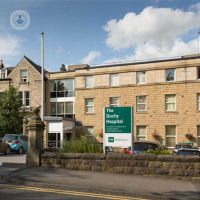Pancreatitis
Mr Satyajit Bhattacharya - Surgery
Created on: 11-13-2012
Updated on: 10-12-2023
Edited by: Conor Lynch
What is pancreatitis?
Pancreatitis is the inflammation of the pancreas, which is a gland found behind the stomach. The pancreas is key when it comes to the digestion of food, as well as the production of hormones that aid in the processing of blood glucose levels.
There are two types of pancreatitis: acute pancreatitis and chronic pancreatitis. Acute pancreatitis refers to the pancreas becoming inflamed suddenly. Chronic pancreatitis is when the pancreas becomes permanently damaged due to inflammation of the pancreas over many years.
If you experience frequent abdominal pain, it is important to see a gastroenterologist.

What are the symptoms of pancreatitis?
The symptoms of acute pancreatitis and chronic pancreatitis differ slightly. The main symptoms of acute pancreatitis include:
- sudden abdominal pain
- fever
- diarrhoea
- nausea & vomiting
The symptoms of chronic pancreatitis include:
- repeated, and often severe abdominal pain (sometimes accompanied by nausea)
- oily, bad-smelling stools
What causes pancreatitis?
Acute pancreatitis is thought to occur when digestive enzymes activate whilst still in the pancreas, causing irritation of the pancreatic cells, and hence, inflammation. The cause of acute pancreatitis has also been linked to gallstones, alcohol consumption, infections, and some medications.
Chronic pancreatitis has largely been attributed to long-term alcohol abuse, smoking, hereditary genetic mutations and immune system problems. In some cases, the cause for a pancreatitis diagnosis is never confirmed.
How is it diagnosed?
There are a number of tests used to make a diagnosis for pancreatitis. The main, most reliable ones include the following:
- blood tests to check for enzyme levels in the pancreas
- stool tests to measure fat levels. Oily stools can indicate that there are problems with the digestive system
- MRI or CT scans
How is pancreatitis treated?
Treatment for acute pancreatitis looks to support bodily functions until inflammation has subsided. The first step in treating acute pancreatitis is to let the pancreas heal, and for the inflammation to subside. To do so, you must be treated in hospital, where you will receive intravenous fluids to replace lost fluids, and medicines to manage pain. Fasting for a few days also helps the pancreas to recover.
Once the pancreas has recovered, doctors can get to work on treating the underlying cause of pancreatitis. Frequently, such additional treatments can include:
- Pancreas surgery – sometimes it is necessary to either remove damaged pancreatic tissue, or to drain excess fluid from the pancreas.
- Gallbladder surgery – removing the gallbladder may be necessary if gallstones are the cause of your pancreatitis.
- Treating alcohol dependency – if alcohol abuse is the cause of your pancreatitis, then you may be entered into an alcohol addiction program.
For those suffering from chronic pancreatitis, then further treatments might be needed. These can include the following:
- Lifestyle changes – adopting a low-fat, nutritious diet, avoiding alcohol, and quitting smoking tends to show the best results for people suffering from chronic pancreatitis.
- Enzyme supplements – these assist in the digestion of food and can be taken with each meal.
- Pain medication – chronic pancreatitis causes continual abdominal pain, so managing this pain is often needed.
What are the main potential and associated complications?
In the majority of cases, patients suffering from acute pancreatitis make a full recovery without suffering any complications. However, there are a handful of patients that suffer from severe acute pancreatitis. These individuals may be at risk of developing multi-organ failure in the short term.
Another potential complication of severe acute pancreatitis is pancreatic necrosis, where the pancreas loses its blood supply and parts of the tissue of the pancreas cease to function. In the intermediate or longer term, patients can develop collections of fluid or pus around the pancreas. Some of these are labelled pseudocysts, sacs of fluid that present and develop on the pancreas' surface.
Symptoms such as bloating, a dull stomach pain, and indigestion are typically felt by people who suffer from pseudocysts.
Chronic pancreatitis can also lead to various health complications. It is quite common, in fact, for people suffering from chronic pancreatitis to eventually develop diabetes. Chronic pancreatitis can also put a patient at high risk of developing pancreatic cancer in the future.

How will I know if it is chronic pancreatitis or pancreatic cancer?
Generally, the symptoms associated with both pancreatic cancer and chronic pancreatitis are extremely similar. In order to make an accurate diagnosis, scans will be required (CT, MRI or Endoscopic Ultrasound). At times, a biopsy may need to be carried out, with the objective being to either diagnose or rule out pancreatic cancer.
If I have acute pancreatitis, will I require a nasal feeding tube?
In cases where patients suffer from severe and persistent vomiting, a nasal feeding tube may be required, and will be administered to patients in hospital.
What is the main warning sign of pancreatitis?
Pain in the upper mid-abdomen area is the main warning sign of pancreatitis that patients should watch out for and report if experienced on a regular basis.
What are the main risk factors that patients should be aware of?
There are a number of risk factors when it comes to potentially suffering from either acute or chronic pancreatitis. Patients should be aware that they are at a higher risk of experiencing pancreatitis if they have gallstones, or indulge in alchol excess. The risk is also higher if they smoke, if they have suffered an abdominal injury in the past, if they have a family history of the condition, or if they have been diagnosed with conditions such as cystic fibrosis or hyperparathyroidism.
Is pancreatitis a life-threatening condition?
Chronic pancreatitis is, in the majority of cases, not fatal. It is estimated that roughly 15 per cent of patients with acute or chronic pancreatitis will later develop severe health conditions that can be fatal, including, as previously mentioned, sepsis.
What foods should I eat if I have pancreatitis?
Foods that are high in protein, that contain antioxidants, and that are low in fats, are ideal for patients suffering from pancreatitis. For more detail, please discuss with your carers or a dietician.

What foods should I avoid?
Patients with pancreatitis are advised to avoid sugary or rich and fatty foods.
Should I change my mealtime routine when recovering from pancreatitis?
For people on the road to recovery from either acute or chronic pancreatitis, eating between six to eight light meals instead of two to three large meals can help recovery and is much better for your pancreas.
When is surgery required?
Surgery is not normally necessary when treating acute pancreatitis except in unusual situations where there is pancreatic necrosis (large parts of the pancreas are dead and affected). However, patients may have to undergo surgery for chronic pancreatitis in the event whereby the pancreas can no longer drain pancreatic fluids as a consequence of tissue scarring.
















